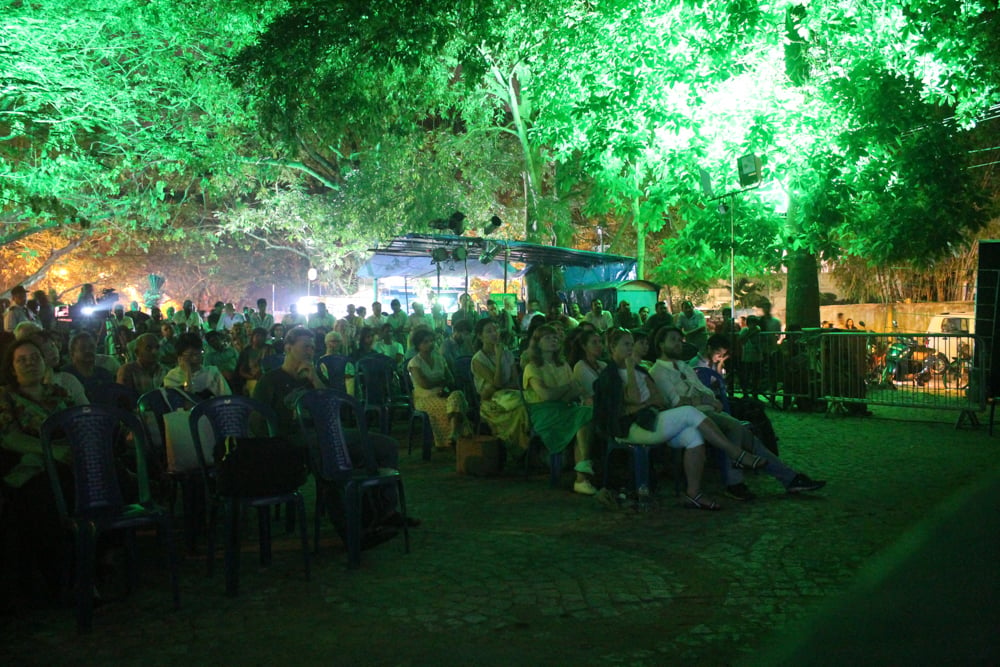
This past December, coinciding with the opening week of the 2016 Kochi-Muziris Biennale, the TBA21-Academy staged the Convening #2, a three-day program of workshops, performances, and talks curated by Ute Meta Bauer, Cesar Garcia, and TBA21-Academy curator Stefanie Hessler.
The program, described by its organizers as “profoundly dedicated to the oceans,” took place between the Cochin Club and Vasco de Gama Square, two historically colonial sites of encounter in Fort Kochi, Kerala.
The events were held every day from December 13-15 as part of a tightly packed schedule, drawing to a close with a performance titled Drifting by Norwegian artist Jana Winderen, who composes music from sound recordings captured by pressure-proof microphones that move underwater across deep seas. At Fort Kochi, Windmeren carried the audience through an aquatic soundscape, from rushing wave to moaning whale.
Jana Winderen, Drifting. Performance during TBA21-Academy’s The Current Convening #2, Kochi, India ©2016. Courtesy Thyssen-Bornemisza Art Contemporary.
“Sixteen land defenders are murdered worldwide each month, and today I dedicate this conversation to them,” began a keynote by art historian and cultural critic TJ Demos. “What we are up against is the $10 million-a-minute spent by the international oil lobby to influence state-level policy,” he continued, citing a statistic released by the IMF earlier this year. A bleak account, certainly, but the message was powerful nevertheless.
“A right to life is also a right to a lifestyle, a right to culture,” argued members of the Indian artists association, KHOJ in their talk. As the modern imagination continues to fail the climate and the environment, it was agreed during a talk on the rights of nature and the international law of the sea that a new language must be developed to address these pressing issues.
Daily structured conversations brought together diverse panelists, including Hawaiian Senator J. Kalani, the special advisor to the World Bank for oceans LeLei Tui Samoa LeLaulu, and Sri Lankan academic Jegan Vincent de Paul. In addition, artist and academic Nabil Ahmed ran a series of “Nuclear Pacific” workshops, which critically addressed topics ranging from affective knowledge to legal language, at once speculative and urgent.
Joan Jonas, Oceans–sketches and note. Performative talk during TBA21-Academy’s The Current Convening #2, Kochi, India ©2016. Courtesy Thyssen-Bornemisza Art Contemporary.
The American artist Joan Jones, meanwhile, pulled together a large crowd for her performance at the Vasco de Game square. The piece was a gentle rendition of underwater lives, gestured slowly through wet watercolor ink spills and a soft-spoken reading.
Integral to the program were the activities of a group of artists brought together by The Current expedition, led by Garcia and Meta Bauer, Including Ho Chi Minh City-based The Propellor Group, which ran through the city, cameras in tow; a site-specific marketplace installation by artist Christopher Meyers; and a seminar around ambiguity led by the former director of Frankfurt’s Ethnographic Museum, Clémentine Deliss.
The artist and environmental activist Ravi Agarwal remained an indispensable voice throughout the three days, leading also a discussion on his own work with ancient Tamil Sangam poetry.
Christopher Myers, Marketplace [Cartography 4]. Installation shot during TBA21-Academy’s The Current Convening #2, Kochi, India ©2016. Courtesy Thyssen-Bornemisza Art Contemporary.
On the last night, Indian writer Aveek Sen, with lilting melody, read from the letters of Ravindranath Tagore.
Is it enough, however, to have a conversation when not many are there to hear it? The Convening #2 remained isolated from the context of its location in Kochi, itself a site of diverse colonial confluence, as well as home to large local populations that live rather fatally close to a turbulent sea.
A short trip to the backwaters reveals an ancient civilization that has lived off land merely inches above sea level, one at the brink of extinction should the tide rise any more than it already has.
The event thus suffered from one visible contradiction: Not enough people had the chance to take part in its exclusive discussions.
With the Kochi-Muziris Biennale running concurrently through the city, the disconnect between the two was palpable and unfortunate. A problem perhaps easy to remedy, should a similar event take place, here or elsewhere.